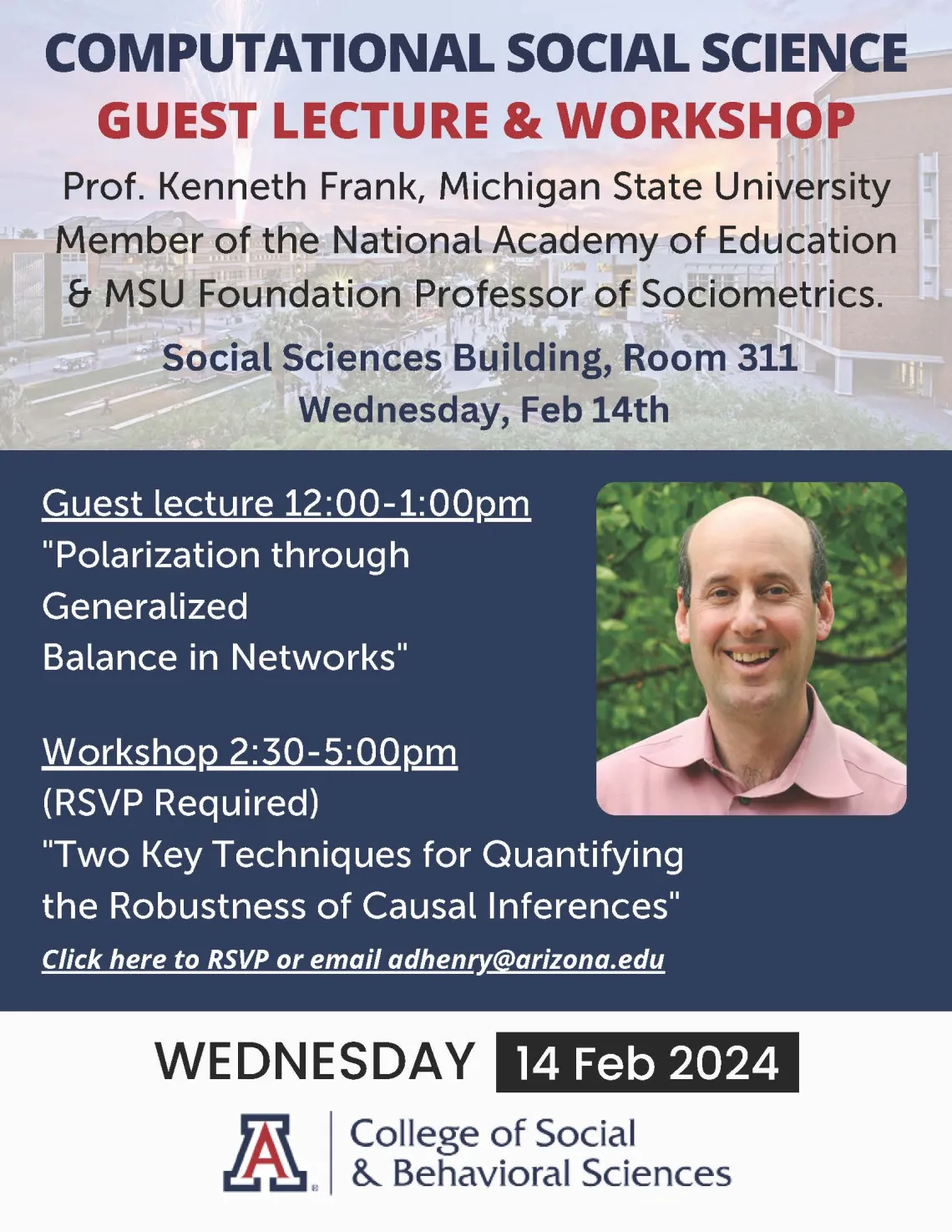
When
The UA Computational Social Science Program is pleased welcome Prof. Kenneth Frank from Michigan State University as a guest speaker on Wednesday, 14 February 2024. Prof. Frank will be giving a talk on political polarization in networks (12:00 - 1:00 p.m.), and in the afternoon will deliver his popular workshop on quantifying the robustness of causal inferences (2:30 - 5:00 p.m.). Both events will be held in the Social Sciences Building, Room 311.
All are welcome to attend one or both events! Please note that space is limited for the workshop, and an RSVP is required. Please RSVP for the causal inference tutorial.
For more information, email Prof. Adam Douglas Henry at adhenry@arizona.edu.
MORE INFORMATION
Guest lecture & workshop by Prof. Kenneth Frank, Michigan State University
Member of the National Academy of Education & MSU Foundation Professor of Sociometrics
TALK TITLE: "Polarization through Generalized Balance in Networks"
TALK TIME & LOCATION: 12:00 - 1:00 pm, Social Sciences Building, Room 311
ABSTRACT
Political polarization has recently been described in relational terms as much as in terms of underlying ideologies or positions on issues. This calls attention to the underlying social dynamics that generate polarization. Here we describe the network dynamics of polarization in terms of generalized balance through which actors align their beliefs with those of their network members either through network influence or selection. Agent based models show how core-periphery network structures yield to polarized networks as generalized balance increases. Moreover, the transition is more dramatic the more generalized balance is manifest in both selection and influence processes. Therefore, attending only to the selection process could lead one to underestimate how rapidly a system can transition from core-periphery to polarized for a small change in generalized balance. Generally, the fact that very different macro level structures can emerge from similar micro-level processes establishes the value of an analysis of the micro-level dynamics of polarization.
WORKSHOP TITLE: Two Key Techniques for Quantifying the Robustness of Causal Inferences
WORKSHOP TIME & LOCATION: 2:30 - 5:00 pm, Social Sciences Building, Room 311 (room is subject to change)
WORKSHOP RSVP LINK: https://uarizona.co1.qualtrics.com/jfe/form/SV_0MrSYcm0HweoWvc
WORKSHOP DESCRIPTION
The phrase “But have you controlled for …” is fundamental to social science but can also create a quandary. Even after controlling for the most likely alternative explanations for an inferred effect there may be some alternative explanation that cannot be ruled out with observed data. The first response is to develop the best models that maximally leverage the available data. After that, sensitivity analyses can inform discourse about an inference by quantifying the unobserved conditions necessary to change the inference.
Specifically, in this course participants will learn how to generate statements such as “An omitted variable would have to be correlated at ___ with the predictor of interest and with the outcome to change the inference.” Or “To invalidate the inference, __% of the data would have to be replaced with counterfactual cases for which the treatment had no effect.” Because these statements express sensitivity in terms of correlations or cases they have wide accessibility. Rooted in the foundations of the general linear model and potential outcomes, the techniques can be adapted to a range of analyses, including logistic regression, propensity-based approaches, and multilevel models. As a result, they can broadly facilitate discourse about inferences among researchers who seek to make an inference, challengers of that inference, policymakers and clinicians.
Participants will use software including the pkonfound commands in R (Stata also available) as well as the app http://konfound-it.com. Participants should be familiar with statistical control as in the general linear model (i.e., regression).
PROF. FRANK'S BIO
Kenneth Frank received his Ph.D. in measurement, evaluation and statistical analysis from the School of Education at the University of Chicago in 1993. He is a member of the National Academy of Education and MSU Foundation professor of Sociometrics, professor in Counseling, Educational Psychology and Special Education; and adjunct (by courtesy) in Fisheries and Wildlife and Sociology at Michigan State University. His substantive interests include the study of schools as organizations, social structures of students and teachers and school decision-making, and social capital. His substantive areas are linked to several methodological interests: social network analysis, sensitivity analysis and causal inference (http://konfound-it.com), and multi-level models. His publications include quantitative methods for representing relations among actors in a social network, robustness indices for sensitivity analysis for causal inferences, and the effects of social capital in schools, natural resource management, and other social contexts.

